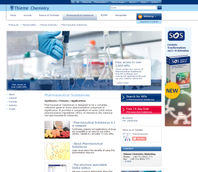Tackling poor quality medicines
The proliferation of poor quality medical products (medicines, vaccines and devices) is an important but neglected public health problem, threatening millions of people all over the world, both in developing and wealthy countries. A recent report from the World Health Organization found that an estimated 1 in 10 medicines in low- and middle-income countries were falsified or substandard. Falsified diazepam found across Scotland has been reported as being “cheaper than chips”.
Falsified and substandard medicines, which may have the incorrect or wrong dose of pharmaceutical ingredients, or no active ingredients at all, may result in death, prolonged illness, side effects or loss of trust in healthcare systems; for antimicrobials they are also likely to be a key driver of antimicrobial resistance (AMR).
Our ability to tackle the issue is hampered by its complexity. Criminals are becoming more sophisticated, using the internet as well as offline pharmacies for distribution, creating falsified medicines and working across geographical boundaries and in countries with varying legislation and levels of enforcement. Errors in factories without sufficient quality control results in substandard medicines, often containing insufficient ingredients, that because they look genuine are hard to detect.
The issue affects a broad range of stakeholders from individual patients, pharmacists and medicine regulatory authorities to the pharmaceutical industry and law enforcement agencies. We need to better understand the scale of the problem, raise awareness and encourage interventions and support so that every country has a functional medicine regulatory agency to ensure that we all have access to medicines we can trust.
This year we are holding a pioneering conference to bring leading professionals from all over the world to Oxford to discuss strategies for tackling poor quality medical products on a global scale.
The conference will be an important opportunity for the diverse stakeholders involved in medicine quality and regulation to come together within the framework of a dedicated academic conference to share ideas and expertise. One of the event’s key objectives is to develop a consensus statement to be widely disseminated to interested parties and policy makers, forming the basis of a coordinated global effort to tackle poor quality medical products.
Most read news
Topics
Organizations
Other news from the department science
These products might interest you

Pharmaceutical Substances by Thieme Verlag
Look up Industrial Syntheses of 2,600 APIs
Your tool for Syntheses, Patents and Applications – Pharmaceutical Substances

KNAUER IJM NanoScaler by KNAUER
Efficient formulation of lipid nanoparticles for RNA-based therapies
Optimise drug encapsulation from 1 ml to hundreds of millilitres with minimal drug input

Get the life science industry in your inbox
By submitting this form you agree that LUMITOS AG will send you the newsletter(s) selected above by email. Your data will not be passed on to third parties. Your data will be stored and processed in accordance with our data protection regulations. LUMITOS may contact you by email for the purpose of advertising or market and opinion surveys. You can revoke your consent at any time without giving reasons to LUMITOS AG, Ernst-Augustin-Str. 2, 12489 Berlin, Germany or by e-mail at revoke@lumitos.com with effect for the future. In addition, each email contains a link to unsubscribe from the corresponding newsletter.
Most read news
More news from our other portals
Last viewed contents
IRCM researchers fuel an important debate in the field of molecular biology

Bio-Techne announces new distribution agreement with Thermo Fisher Scientific
“Gut”-throat competition: U-M research on digestive tract bacteria yields surprising findings - Native bacteria help fend off invaders, study finds – suggesting ways to prevent or treat the effects of some dangerous forms of E. coli
BioPhausia focuses and sells OTC products to Meda for SEK 190 million

“Star Wars therapy” for adolescents on autism spectrum - Mind power: Improvements without medication

Analytica 2020: Bioanalysis for personalized medicine






















































